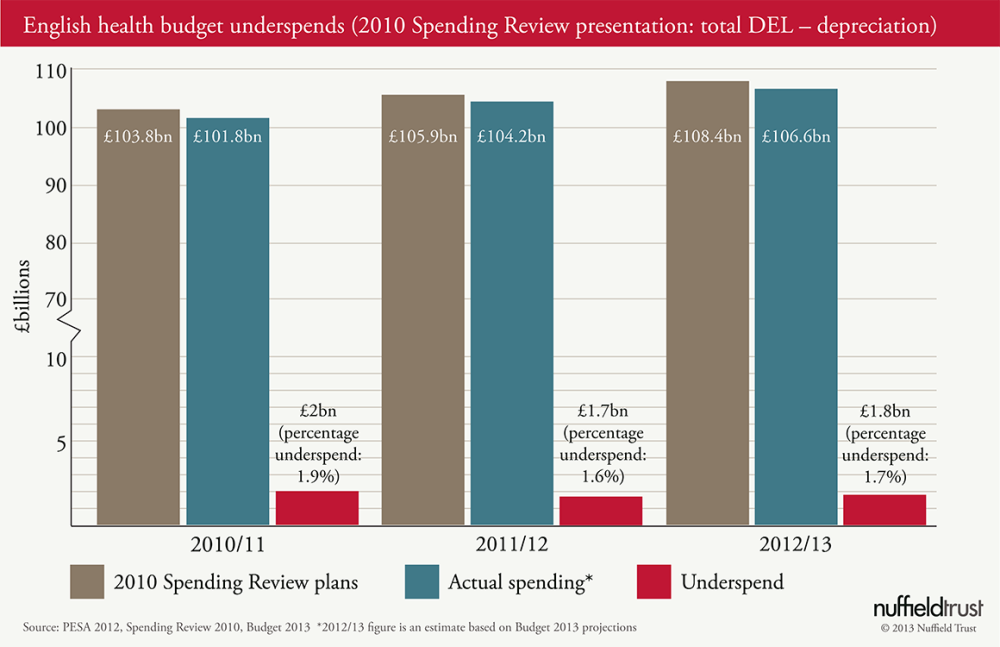The Chancellor announced the outcome of the 2013 Spending Review yesterday. He confirmed that the NHS has been spared the full force of Government cuts for another year. The health budget is rising in headline terms by just 0.1 per cent after inflation. As expected, part of the health budget is earmarked to be transferred to social care.
This continues the precedent established in the 2010 Spending Review which set aside money each year for social care – by 2014 £1 billion of the health budget was designated for social care. In the latest Spending Review the sums involved are much larger – an additional £2 billion.
This will form part of a pooled budget of £3.8 billion with at least £1 billion of the funding linked to outcomes such as reduced emergency admissions.
In December we published a report: A decade of austerity?, which examined the financial outlook for the NHS in England over the decade, anticipating that the NHS would need to find efficiency savings of four per cent a year for a decade rather than the initial four year QIPP plan.
In July, the Office for Budget Responsibility (the Government’s official economic forecasting body) will update their long-term projections and will almost certainly conclude that there is a structural problem with the public finances. Pressures on services such as health, pensions and long-term care will continue to rise faster than tax receipts even after the economy has recovered.
Across the NHS the pace of change needs to increase and the focus must shift from short-term fixes to long-term transformation. Doing this requires action locally and nationally
Against this background the next Spending Review in 2015 is likely to be even tougher, unless there is a significant increase in tax or the Government has a major change of heart on fiscal policy. It’s difficult to see how the Government can continue indefinitely to protect the health budget from an equal share of the overall cut to departmental spending.
A number of public services face further cuts of around 10 per cent in 2015/16 on top of the cuts in the last Spending Review. By 2015/16 health will account for 35 per cent of all current spending on public services.
Both the National Audit Office and Health Select Committee have pointed out that the current QIPP plan is very reliant on central initiatives – holding down national pay settlements and cutting administration.
The Committee said: ‘the evidence presented to the Committee demonstrates that the measures currently being used to respond to the Nicholson Challenge too often represent short-term fixes rather than the long-term transformations which the service needs.’
Although the NHS is delivering savings, there are also increasing signs of the pressures on the service. In 2012/13 Foundation Trusts delivered savings of 3.4 per cent of their budget down from the 3.9 per cent achieved in 2011/12, and increasing numbers of hospitals are reporting deficits.
The 2013 Spending Review coupled with the recent pressures on emergency services adds further weight to the Committee’s arguments – the NHS cannot afford to continue with its current approach to QIPP. The Spending Review continued to focus on top-down initiatives:
- pay awards are capped at one per cent in 2015/16 and there is a commitment to end automatic pay progression;
- administrative budgets will be reduced by 10 per cent in real terms.
Whilst these initiatives may help the NHS balance the books they are not enough. Across the NHS the pace of change needs to increase and the focus must shift from short-term fixes to long-term transformation. Doing this requires action locally and nationally.
Change is rarely possible without some cost. It will need investment for example in integrated IT and in training and development to support health care workers to take on new roles. The current NHS budget could support such investment. In 2012/13 it looks like the health budget was under-spent once again, by a further £1.8 billion (in Spending Review 2010 terms).
Over the last 3 years almost £5.5 billion of planned health spending has not been used and has been returned to the Treasury. The chart below shows how actual spending compares to the original 2010 Spending Review numbers.

The Department of Health has always claimed that this under-spending was the result of prudential financial management in a system where there is no scope to over-spend the budget. But without an effective system of carryover (the Department of Health has not been allowed any access to the Budget Exchange Scheme for the 2012/13 underspend), this approach does not look to be serving the long-term interest of the NHS.
To reduce the systemic under-spending would require the Department of Health and NHS to take a different approach to risk management, shifting from a reliance on planned surplus and requirements, to spend non-recurrently towards a focus on investing in support for transformation to improve efficiency and productivity.
Without such as shift we are storing up financial risk as clinical commissioning groups and NHS providers will find it harder and harder to match rising demand to a stagnant budget.
Suggested citation
Charlesworth A (2013) ‘Act now or repent at leisure’. Nuffield Trust comment, 27 June 2013. https://www.nuffieldtrust.org.uk/news-item/act-now-or-repent-at-leisure
